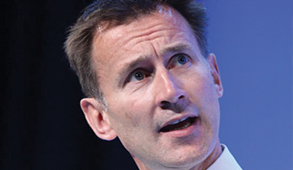Staff numbers key to recovery
 In a report, the Commons Health and Social Care Committee said that the temptation to concentrate on elective waiting lists was understandable, given that 5.8 million people were waiting for planned care and predictions this could double within three years.
In a report, the Commons Health and Social Care Committee said that the temptation to concentrate on elective waiting lists was understandable, given that 5.8 million people were waiting for planned care and predictions this could double within three years.
But it warned that ‘a numerical target-driven approach risks jeopardising equally important areas of care that keep people healthy and out of hospital’.
The broad recovery plan should cover mental health, and primary, community and social care, as well as emergency provision.
However, committee chair Jeremy Hunt (pictured) said better workforce planning was also needed to underpin recovery. The government had ignored calls to introduce independent assessments of the staffing needed, which should take place at least once every two years, he added. The health committee and the NHS have backed the workforce assessment measure. The committee believed that without the assessments it will remain impossible to know whether enough doctors, nurses or care staff are being trained.
Mr Hunt insisted that the NHS faced ‘an unquantifiable challenge’ in tackling the wider backlog. ‘Our report finds that the government’s recovery plans risk being thrown off course by an entirely predictable staffing crisis. The current wave of Omicron is exacerbating the problem, but we already had a serious staffing crisis, with a burnt-out workforce, 93,000 NHS vacancies and no sign of any plan to address this,’ he said.
‘Far from tackling the backlog, the NHS will be able to deliver little more than day-to-day firefighting unless the government wakes up to the scale of the staffing crisis facing the NHS, and urgently develops a long-term plan to fix the issue.’
The government said it had committed to recruiting and retaining 50,000 more nurses by the end of this Parliament and had allocated additional funding to tackle the backlog.
The Nuffield Trust acknowledged NHS staff numbers had increased over the last two years, but insisted severe shortages remained in health and care.
Strategy director Helen Buckingham said: ‘The government has admitted it is not on track to meet its GP recruitment ambitions with staffing levels actually falling in the last two years, and the fragile social care sector has seen at least 42,000 staff members leave their posts in the six months to October last year.
‘Restricted access to services in the community both drives up the number of patients seeking care via emergency and A&E services, and makes it harder for hospitals to discharge patients who need ongoing care, thus piling additional pressure on hospitals.
‘The government must be realistic about the pace at which the health service can rebound with the staffing it has.’
Related content
We are excited to bring you a fun packed Eastern Branch Conference in 2025 over three days.
This event is for those that will benefit from an overview of costing in the NHS or those new to costing and will cover why we cost and the processes.